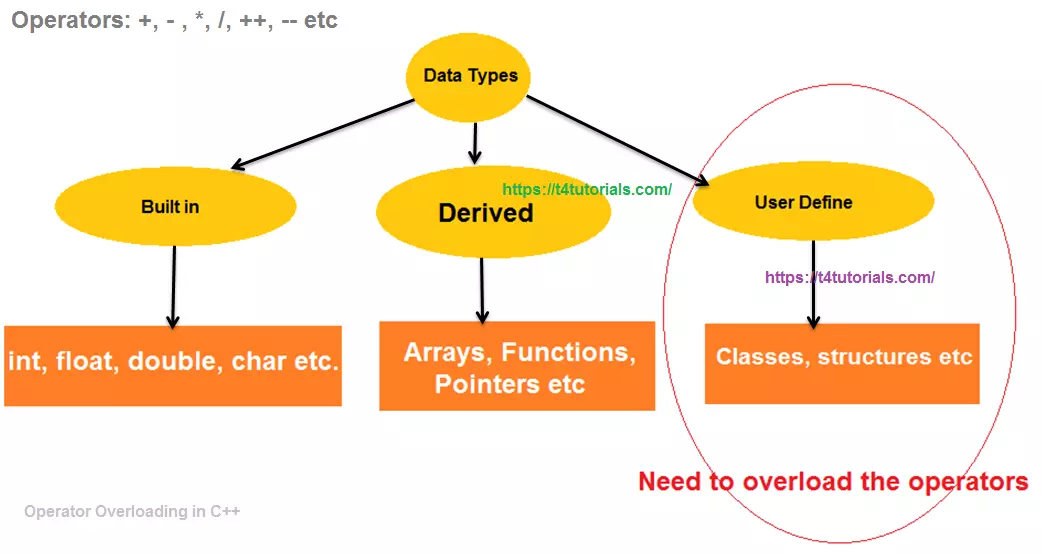Rules of Operator Overloading in C++
Operator overloading is a type of static or compile-time polymorphism. C++ supports the compile-time polymorphism. The function overloading and the operator overloading are common examples of compile-time polymorphism.- Only built-in operators like (+, -, *, /, etc)can be overloaded.
- We cannot overload all of those operators that are not a part of C++ language like ‘$’.
- We can’t change the arity of the operators. The arity of an operator is the number of operands that the operator takes.
- We can overload the unary operator as an only unary operator, and we cannot overload it as a binary operator and similarly, We can overload binary operators as an only binary operator, and we cannot overload it as a unary operator.
- During the operator overloading, we cannot change the actual meaning of an operator. For example, We cannot overload the plus(+) operator to subtract one value form the other value.
- The precedence of the operators remains the same during operator overloading.
- The operator overloading is not possible for built-in data types. At least one user-defined data types must be there.
- Some operators like assignment “=”, address “&” and comma “,” are by default overloaded.
- When using binary operators overloaded through a member function, the left-hand operand must be an object of the relevant class.
List of operators that can be overloaded
List of operators that can be overloaded are mentioned below;| + | – | * | / | % | ^ |
| |= | *= | <<= | >>= | [] | () |
| delete | delete [] | new | new [] | -> | ->* |
| << | >> | == | != | && | || |
| += | -= | /= | %= | ^= | &= |
| & | | | ~ | ! | , | = |
| < | > | <= | >= | ++ | — |
More Operator Overloading Programs
- == Operator Overloading in C++.
- insertion and extraction Operator Overloading in C++.
- >= Operator Overloading in C++
- <= Operator Overloading in C++
- program of Logical Or operator Overloading C++.
- Overloading the multiple operators together in a C++program
List of operators that cannot be overloaded
List of operators that cannot be overloaded are mentioned below;- Scope Resolution Operator (::)
- Pointer-to-member Operator (.*)
- Member Access or Dot operator (.)
- Ternary or Conditional Operator (?:)
- Object size Operator (sizeof)
- Object type Operator (typeid)
How Operator Overloading works with functions in C++
Operator overloading can be done by implementing a function and the function can be a;- Member Function
- Non-Member Function
- Friend Function
Operator overloading Examples in C++ [with error]
|
1 2 3 4 5 6 7 8 9 10 11 12 13 14 15 16 17 18 19 |
#include<iostream> using namespace std; class T4Tutorials{ int T4Tutorials_Number; public: T4Tutorials() //constructor { T4Tutorials_Number=0; } void operator++() }; int main() { T4Tutorials t1; //t1 is object of class ++t1; // prefix increment of object } |
Operator overloading Examples in C++ [correct = without error]
This program is showing the operator overloading of the prefix increment operator.|
1 2 3 4 5 6 7 8 9 10 11 12 13 14 15 16 17 18 19 20 21 22 23 24 25 26 27 |
#include<iostream> using namespace std; class T4Tutorials{ int T4Tutorials_Number; public: T4Tutorials() //constructor { T4Tutorials_Number=0; } void operator++() //function for operator overloading { ++T4Tutorials_Number; //prefix increment cout<<"The operator is overloaded successfully: "<<T4Tutorials_Number<<endl; } }; int main() { T4Tutorials t1; //t1 is object of class ++t1; // prefix increment of object } |
Operator overloading of Postfix increment operator in C++
This program is showing the operator overloading of the postfix increment operator.|
1 2 3 4 5 6 7 8 9 10 11 12 13 14 15 16 17 18 19 20 21 22 23 24 25 26 |
#include<iostream> using namespace std; class T4Tutorials{ int T4Tutorials_Number; public: T4Tutorials() //constructor { T4Tutorials_Number=0; } void operator++(int) //function for operator overloading { T4Tutorials_Number++; //prefix increment cout<<"The operator is overloaded successfully: "<<T4Tutorials_Number<<endl; } }; int main() { T4Tutorials t1; //t1 is object of class t1++; // prefix increment of object } |
Operator overloading of Postfix decrement operator in C++
This program is showing the operator overloading of the postfix decrement operator.|
1 2 3 4 5 6 7 8 9 10 11 12 13 14 15 16 17 18 19 20 21 22 23 24 25 26 |
#include<iostream> using namespace std; class T4Tutorials{ int T4Tutorials_Number; public: T4Tutorials() //constructor { T4Tutorials_Number=0; } void operator--(int) //function for operator overloading { T4Tutorials_Number--; //prefix increment cout<<"The operator is overloaded successfully: "<<T4Tutorials_Number<<endl; } }; int main() { T4Tutorials t1; //t1 is object of class t1--; // prefix increment of object } |
